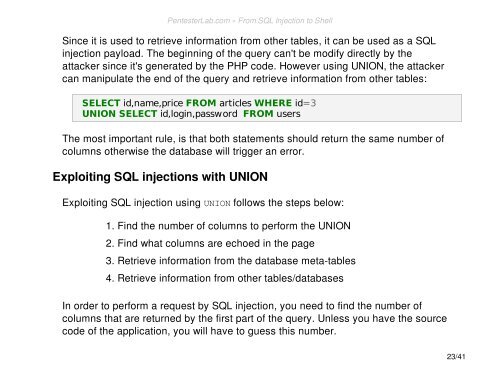from_sqli_to_shell
from_sqli_to_shell
from_sqli_to_shell
Create successful ePaper yourself
Turn your PDF publications into a flip-book with our unique Google optimized e-Paper software.
PentesterLab.com » From SQL Injection <strong>to</strong> Shell<br />
Since it is used <strong>to</strong> retrieve information <strong>from</strong> other tables, it can be used as a SQL<br />
injection payload. The beginning of the query can't be modify directly by the<br />
attacker since it's generated by the PHP code. However using UNION, the attacker<br />
can manipulate the end of the query and retrieve information <strong>from</strong> other tables:<br />
SELECT id,name,price FROM articles WHERE id=3<br />
UNION SELECT id,login,password FROM users<br />
The most important rule, is that both statements should return the same number of<br />
columns otherwise the database will trigger an error.<br />
Exploiting SQL injections with UNION<br />
Exploiting SQL injection using UNION follows the steps below:<br />
1. Find the number of columns <strong>to</strong> perform the UNION<br />
2. Find what columns are echoed in the page<br />
3. Retrieve information <strong>from</strong> the database meta-tables<br />
4. Retrieve information <strong>from</strong> other tables/databases<br />
In order <strong>to</strong> perform a request by SQL injection, you need <strong>to</strong> find the number of<br />
columns that are returned by the first part of the query. Unless you have the source<br />
code of the application, you will have <strong>to</strong> guess this number.<br />
23/41


